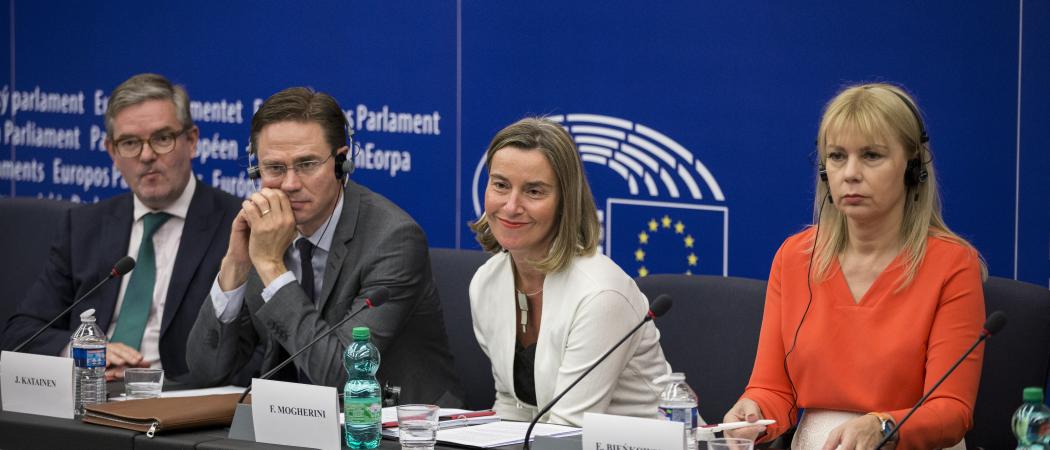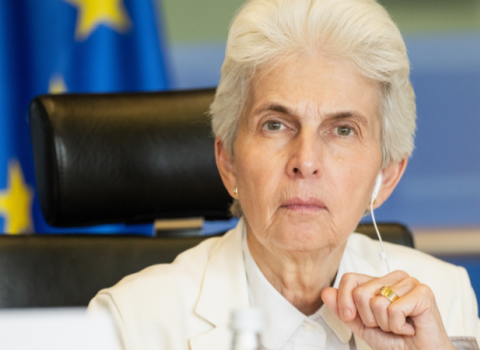The first-ever military research programme will propel the EU to fourth biggest spender on defence R&D in Europe. Non-EU countries and companies will get limited access

The European Commission announced the fund in Strasbourg on June 13. (Photo: European Commission)
The European Commission has unveiled details of its first ever €13 billion defence fund, with €4.1 billion for research, €8.9 billion for prototype development and €650 million for disruptive technologies, in fields including cyber security, border control, hi-tech uniforms, drones and radar technology.
The relatively modest fund, will restrict, but not entirely block, access to non-European countries and subsidiaries of foreign-owned companies, while military assets “specifically designed to carry out lethal strikes without any human control” will not be funded.
The investment from 2021-2027 will, “put Europe into the top four for defence investment in Europe,” said Jyrki Katainen, Commission vice-president.
It is also supposed to reduce overlapping expenditure by EU states on national equipment that does not always work together.
Despite disquiet among a section of researchers over the decision to back military research, the funding has proved popular. Last year, the EU received submissions from 190 companies and research bodies from countries including the UK, Italy, Estonia, France, Greece, Lithuania, the Netherlands, Portugal, Spain and Sweden, in response to three competitions it ran in a pilot.
To be eligible, projects must involve at least three companies from three EU countries. “We are talking about EU money for EU countries and EEA countries [Iceland, Liechtenstein and Norway],” said EU industry commissioner Elżbieta Bieńkowska.
Although the UK, which has a history of blocking EU-led defence, could eventually negotiate entry to the fund after Brexit, it has so far met with an uncompromising approach from the EU on security cooperation. The country’s access to the military and security elements of the Galileo satellite navigation programme remains at risk.
Restricted access for foreign subsidiaries
Although Bieńkowska was adamant the fund, “Is designed for the EU-27 member states,” the legal text, says European subsidiaries of foreign manufacturers will not in principle be excluded from applying for grants. They must satisfy officials they are not “subject to control” from their parent company and will need to prove they have internal firewalls to prevent sensitive or classified information traveling outside Europe.
As a general rule, infrastructure, facilities, assets and resources used by fund recipients and their subcontractors should all be based in the EU. The Commission may, in exceptional circumstances, permit access to projects for organisations from non-EU countries, but it will not cover their costs.
Political concerns over giving money to subsidiaries of US, Russian or Chinese companies, some of which have ties to their governments, are “already well known,” said a senior Commission official. “The member states will act as these companies’ sponsors; they’ll have to ensure our conditions are fulfilled,” the official said. “Another filter will be us. We will analyse projects and partners before making any decisions. We’re not an armament agency, but we can ensure different safety nets are in place.”
The Commission will not treat companies hailing from traditional allies like the US any differently from companies with origins in Russia or China. “Who’s an ally today might not be an ally tomorrow,” the Commission official said.
Fears over Trump direction
Clashes with US president Donald Trump have served to strengthen resolve on defence in Brussels, and deepened the belief that the continent must become less reliant on others.
Trump has belittled Europe’s record on defence investment and angered many with his abandonment of the international deal that constrained Iran’s nuclear programme, and the introduction of tariffs on steel and aluminium.
On the US side, there are some concerns that EU plans for defence, including spending under a programme called the Permanent Structured Cooperation on Security and Defence, could pull resources away from NATO.
Greater EU cooperation on defence, “Would have been unthinkable a few years ago”, said Federica Mogherini, the EU's foreign-policy chief. “But factors in the last year have strengthened the need for autonomy. You may have noticed the world is living in difficult times,” she said.





 A unique international forum for public research organisations and companies to connect their external engagement with strategic interests around their R&D system.
A unique international forum for public research organisations and companies to connect their external engagement with strategic interests around their R&D system.